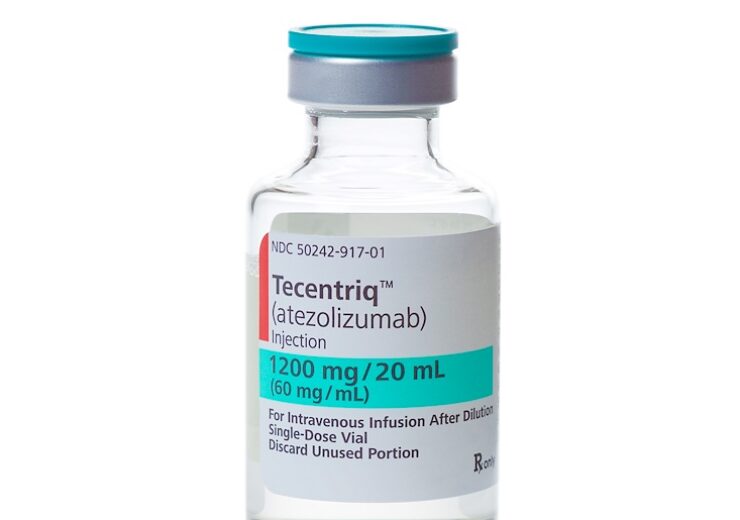The approval was based on results from the Phase IB/III IMscin001 study which showed the SC formulation showed comparable levels of Tecentriq in the blood

A product shot of Tecentriq. (Credit: F. Hoffmann-La Roche Ltd)
Roche has received marketing authorisation from the European Commission (EC) for Tecentriq SC (atezolizumab) as a subcutaneous injection for all approved indications of the drug’s intravenous formulation (Tecentriq IV).
Tecentriq in Tecentriq SC is the same monoclonal antibody as in Tecentriq IV. It has been created to bind with programmed death ligand-1 (PD-L1) and block its interactions with both PD-1 and B7.
The subcutaneous injection combines Tecentriq with Enhanze drug delivery technology of Halozyme Therapeutics.
EC’s authorisation makes Tecentriq SC the first PD-L1 cancer immunotherapy for subcutaneous injection approved in the European Union.
The new SC injection is expected to reduce the treatment time to around seven minutes compared to approximately 30-60 minutes taken for the IV infusion.
Roche chief medical officer and global product development head Levi Garraway said: “We are pleased to introduce the first subcutaneous PD-L1 cancer immunotherapy in Europe.
“Giving Tecentriq subcutaneously provides more flexibility to patients, while also helping to free up resources in constrained healthcare systems.”
The approval was based on results from the Phase IB/III IMscin001 study that compared the pharmacokinetics, safety, and efficacy of Tecentriq SC, compared with Tecentriq IV.
The trial enrolled 371 patients with previously treated locally advanced or metastatic non-small cell lung cancer (NSCLC) on whom the prior platinum therapy did not work.
According to the data, the levels of Tecentriq in the blood was comparable, when administered subcutaneously, thereby meeting the primary endpoints.
In addition, the safety and efficacy profile of the SC version was consistent with the IV formulation.
Furthermore, 90% of healthcare professionals agreed that the SC version is easy to deliver and 75% of them said that the subcutaneous injection will save time in comparison to the IV formulation.
Roche said that Tecentriq SC can be given by a healthcare professional outside of the hospital, in a community care setting, or at the home of the patient.
The company is also planning to include Tecentriq SC in possible cancer homecare initiatives.
